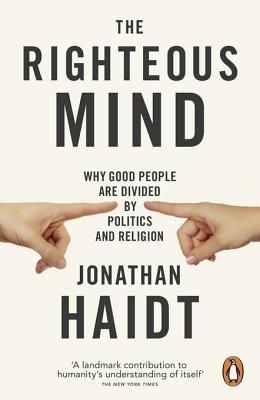More on this book
Community
Kindle Notes & Highlights
William James,
“functionalist” approach to the mind.
Human beings are the world champions of cooperation beyond kinship,
and we do it in large part by creating systems of formal and informal accountability.
intuitive politicians striving to maintain appealing moral identities in front of our multiple constituencies.
Appearance is usually far more important than reality.
Exploratory thought is an “evenhanded consideration of alternative points of view.” Confirmatory thought is “a one-sided attempt to rationalize a particular point of view.”
Our moral thinking is much more like a politician searching for votes than a scientist searching for truth.
Mark Leary,
self-esteem is more like an internal gauge, a “sociometer” that continuously measures your value as a relationship partner.
the fact is that we care a lot about what others think of us.
OUR IN-HOUSE PRESS SECRETARY AUTOMATICALLY JUSTIFIES EVERYTHING
confirmation bias, the tendency to seek out and interpret new evidence in ways that confirm what you already think.
if it’s your belief, then it’s your possession—your
started off with a hunch—in
usually concluded that the evidence proved them right.
“people invest their IQ in buttressing their own case rather than in exploring the entire issue more fully and evenhandedly.”
One side looks a bit more attractive than the other. The elephant leans, ever so slightly, and the rider gets right to work looking for supporting evidence—and
If thinking is confirmatory rather than exploratory in these dry and easy cases, then what chance is there that people will think in an open-minded, exploratory way when self-interest, social identity, and strong emotions make them want or even need to reach a preordained conclusion?
WE LIE, CHEAT, AND JUSTIFY SO WELL THAT WE HONESTLY BELIEVE WE ARE HONEST
MPs thought they were wearing the ring of Gyges—until
“plausible deniability.”
lab experiments that give people invisibility combined with plausible deniability, most people cheat.
most of these cheaters leave the experiment as convinced of their own virtue
when we want to believe something, we ask ourselves, “Can I believe it?”
we search for supporting evidence,
when we don’t want to believe something, we ask ourselves, “Must I believe it?”
we search for contrary evidence, and if we find a single reason to doubt the claim, we can dismiss
“motivated reasoning,”
people can literally see what they want to see—given a bit of ambiguity—is
for nonscientists, there is no such thing as a study you must believe.
Eric Schwitzgebel
“skilled arguers … are not after the truth but after arguments supporting their views.”
the confirmation bias is a built-in feature (of an argumentative mind), not a bug that can be removed (from a platonic mind).
we must be wary of any individual’s ability to reason. We should see each individual as being limited, like a neuron.
good reasoning as an emergent property of the social system.
intellectual and ideological diversity within any group
or institution whose goal is t...
This highlight has been truncated due to consecutive passage length restrictions.
or to produce good pub...
This highlight has been truncated due to consecutive passage length restrictions.
minor and inexpensive tweaks to the environment, which can produce big increases in ethical behavior.
design institutions in which real human beings, always concerned about their reputations, will behave more ethically.
THERE’S MORE TO MORALITY THAN HARM AND FAIRNESS
The righteous mind is like a tongue with six taste receptors.
Western, educated, industrialized, rich, and democratic
WEIRD).
world full of separate objects, rather than relationships.
framed-line task,
holistically
analytically


